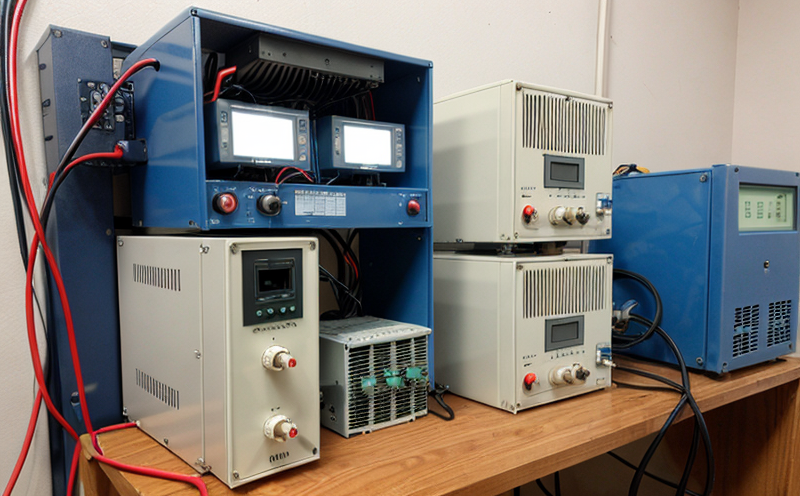IEC 62620 Performance Testing of Lithium Batteries in Rail Systems
The IEC 62620 standard is a critical specification for ensuring the safety, reliability, and performance of lithium batteries used in railway applications. This standard sets out comprehensive testing protocols to evaluate the performance characteristics of these batteries under various conditions relevant to rail systems.
Testing according to IEC 62620 involves evaluating multiple parameters that are crucial for the safe operation of lithium batteries in railways. These include but are not limited to thermal stability, electrical resistance, and energy efficiency. The tests are designed to simulate real-world operating conditions such as temperature variations, load cycling, and vibration.
One of the key aspects of this testing is the evaluation of battery performance under extreme temperatures, which can vary widely in railway environments. Lithium batteries must withstand both high ambient temperatures during summer operations and low temperatures encountered during winter months. The tests ensure that the batteries maintain their capacity and cycle life over extended periods.
The electrical resistance test measures how efficiently electricity flows through the battery under load conditions, which is essential for maintaining power supply reliability in railway systems. Energy efficiency testing assesses how effectively the battery can convert chemical energy into electrical energy during discharge cycles, ensuring optimal performance and longevity.
Additionally, this standard includes tests to evaluate the mechanical integrity of lithium batteries subjected to vibrations typical of rail operations. These mechanical stress tests are vital for preventing failures that could compromise safety or disrupt service schedules.
The rigorous nature of IEC 62620 ensures that railway operators can rely on high-quality, dependable power supplies from lithium batteries. By adhering to these standards, manufacturers and suppliers demonstrate compliance with international best practices, thereby enhancing customer confidence in their products.
- Thermal Stability
- Electrical Resistance
- Energy Efficiency
- Vibration Testing
- Load Cycling Evaluation
- Cycling Life Assessment
- Short Circuit Protection
Applied Standards
The IEC 62620 standard is primarily based on the International Electrotechnical Commission's (IEC) guidelines for lithium batteries used in transportation applications. This standard has been developed to address specific challenges faced by railway systems when integrating advanced battery technologies.
For instance, section 10 of IEC 62620 focuses explicitly on the performance characteristics of lithium batteries in electric traction applications. It provides detailed protocols for assessing how these batteries behave under dynamic loads and varying environmental conditions, which are particularly relevant to rail systems.
The standard also references other key international standards such as ISO/IEC 18097-2 (lithium-ion cells and batteries) and IEC 62133 (safety of rechargeable small battery packs). These additional standards ensure a holistic approach to evaluating the safety and performance of lithium batteries.
Compliance with IEC 62620 is not only crucial for meeting regulatory requirements but also enhances the reputation of manufacturers by demonstrating their commitment to quality and innovation. Rail operators can trust that batteries tested according to this standard meet stringent international benchmarks, ensuring reliability and safety in railway operations.
Manufacturers who adhere to these standards benefit from increased market access, improved brand perception, and enhanced product performance. The rigorous testing process helps identify potential issues early on, allowing for necessary improvements before the products reach the market.
Eurolab Advantages
At Eurolab, we pride ourselves on providing comprehensive and accurate lithium battery performance tests according to IEC 62620. Our state-of-the-art facilities offer the latest in testing equipment and methodologies, ensuring that every test adheres strictly to international standards.
We have a team of highly experienced engineers who possess deep expertise in railway systems and electrical power supply technologies. This knowledge allows us to provide tailored solutions that meet the specific needs of our clients. Our facilities are equipped with cutting-edge instrumentation capable of simulating real-world operating conditions, including temperature cycling chambers, vibration test rigs, and load testing machines.
Our commitment to quality is reflected in the meticulous attention we pay to every aspect of the testing process—from specimen preparation to final reporting. We ensure that all tests are conducted under controlled conditions, using standardized procedures, to achieve consistent and reliable results.
We also offer post-testing analysis services, providing detailed reports that help clients understand the performance characteristics of their batteries. Our analysts can provide insights into areas where improvements may be necessary or potential issues that could impact reliability.
At Eurolab, we take pride in our reputation for delivering accurate and reliable test results. Our clients benefit from reduced development times, improved product quality, and enhanced market competitiveness. By partnering with us, they can ensure their products meet the highest international standards while gaining a competitive edge in the global market.
Why Choose This Test
- Comprehensive Evaluation of Battery Performance
- Reputational Boost for Compliance with International Standards
- Enhanced Market Access and Competitive Edge
- Increased Product Quality and Reliability
- Mitigation of Safety Risks in Railway Operations
- Improved Operational Efficiency and Reduced Downtime
- Accurate and Reliable Test Results
- Tailored Solutions for Specific Client Needs





